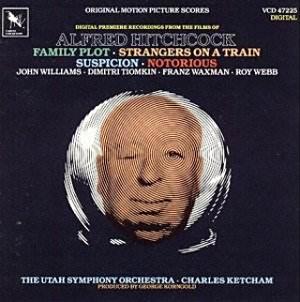Collection:
Alfred Hitchcock
Strangers on a Train Dimitri Tiomkin
Suspicion Franz Waxman
Notorious Roy Webb
Family Plot John Williams
The Utah Symphony Orchestra conducted by Charles Ketchum
Available on Varèse Sarabande VCD 47225
Running time: 37.50
Amazon US

This marvellous album was first released in 1985, when I snapped it up in its LP format. It is now on CD, though it may be difficult to find, and is currently not listed even on the official Varèse Sarabande website.
Tiomkin's score for Strangers on a Train is simply magnificent. It towers over all the other music on this album. And that is some statement for all the other works have stature. The 16minute plus Strangers... suite opens with one of Tiomkin's most powerful and memorable ‘Main Titles’. Here is Tiomkin's pronouncedly individual style, with its great rhythmic energy, magnificent tunes, and opaque rough-edged sonorities. In this Hitchcock thriller Farley Granger is Guy, a champion tennis player who is approached on a train by Bruno (Robert Walker) who proposes they swap murders. He will kill Guy's unsympathetic and unwanted wife while Guy kills Bruno's over-dominant father. The music for Guy reflects his somewhat passive character, while Bruno's music denotes his mania in the demonstrably glassy, ghostly tones of high violin harmonics. These two themes (both heard in the main title) are heard to spectacular effect in the tennis match scene, in which Guy has to race against time to finish his game and prevent Bruno planting incriminating evidence in the form of a cigarette lighter. Ketchum and the Utah players succeed magnificently in screwing up the tension implicit in this wonderfully thrilling music.
For Hitchcock's last film, Family Plot, John Williams provided a sparkling score that helped to lift this disappointingly tensionless black comedy of errors. The album includes the polished and elegant 'End Titles' that summarise all the main themes including the wordless female voices representing the "mystical" aura - complete with phoney crystal ball - which surrounds Blanche; and the glittering, elegant harpsichord theme. Who knows what might have developed from a partnership of Williams and Hitchcock?
Franz Waxman's music for Suspicion is full of atmosphere and suspense; it is also thoroughly English-sounding as is appropriate to its setting. (this was the second Hitchcock 'English' story filmed in Hollywood that Waxman had scored, the first being Rebecca). The opening 'Main Titles' music has a glitter and glamour that is infectious although there are shadows lurking. For 'Sunday Morning', as Cary Grant courts Joan Fontaine, the material is mainly sunny, optimistic and upbeat as Fontaine is elatedly swept off her feet. Yet again there are passing clouds, particularly in that brief, enigmatic, cold long shot where the sky darkens and it appears that Grant's embrace has something sinister and threatening about it. The mood darkens as Fontaine discovers that her husband is an irresponsible playboy fond of gambling, and a spendthrift and a liar. She suspects that he has killed his best friend and that he maybe intending to kill her next. The music swirls menacingly and for the famous scene where Grant races along the cliff road with Fontaine thinking he is about to push her out of the car, Waxman provides a thrilling, pounding accompaniment ('Too Fast') that screws the tension up to fever pitch.
The least well-known composer represented in this collection is Roy Webb, who did such sterling work at RKO Radio. Hitchcock's Notorious inspired Webb to write one of his best scores. The ‘Main Title’ impresses with an urgent note of danger and intrigue contrasted with a memorable sweeping romantic theme for Cary Grant and Ingrid Bergman. This short suite includes Webb's tense, strongly characterful and evocative music for Sebastian (Claude Rains) as he detects Grant's intrusion and discovery of the uranium hidden in his wine cellar; and the equally suspenseful music for the scenes where Bergman lies poisoned by Sebastian and his mother, before she is rescued by Grant; and finally to underscore Sebastian's doom as he faces the wrath of his fellow Nazi conspirators.
For those who have the LP version of this recording I suggest they keep treasuring it because it sounds richer and fuller than this CD incarnation - yet, notwithstanding this setback, the album is strongly recommended.
Ian Lace
41/2
Return to Index